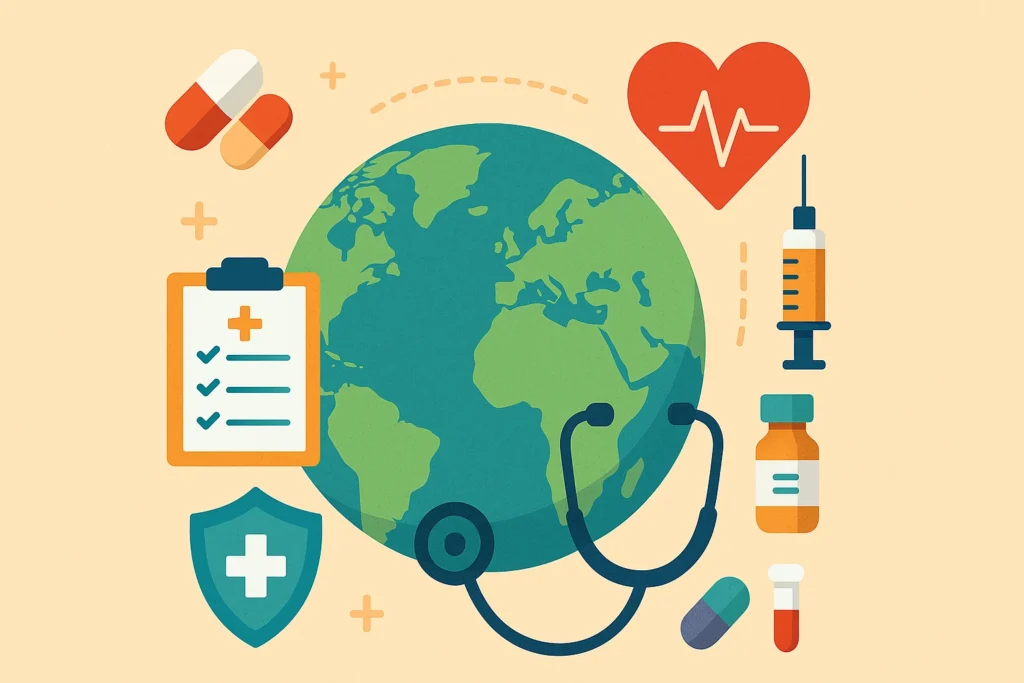Introduction: Why Is Health Important?
Human health is the foundation of a vibrant, productive, and high-quality life. No society can achieve sustainable economic growth, social equality, or scientific advancement without healthy people. In this regard, the United Nations has designated the third goal of the Sustainable Development Goals (SDGs) as: Ensure healthy lives and promote well-being for all at all ages.
Main keywords: global health, sustainable development, COVID-19, healthcare, well-being, mortality, epidemic, universal health coverage, communicable diseases, mental health
The Impact of COVID-19 on Global Health
Since late 2019, the outbreak of the coronavirus posed unprecedented challenges to health systems worldwide. By mid-2022, more than 500 million people globally had been infected with COVID-19. Global estimates indicate that excess deaths related to the pandemic—both direct and indirect—may have reached 15 million by the end of 2021. These figures include not only the direct fatalities from the virus but also indirect effects such as disrupted medical services, increased mental health issues, and reduced access to essential care.
Psychological and Social Impacts of the Pandemic
The pandemic led to a sharp rise in anxiety, depression, and isolation worldwide. Millions of people were affected psychologically due to lockdowns, loss of loved ones, or economic hardships. According to reports from the World Health Organization (WHO), mental health suffered as much as physical health, highlighting the urgent need for investment in mental health services and public education.
Global Health Targets for 2030
To address global health challenges such as pandemics, communicable diseases, road accidents, food insecurity, and environmental pollution, multiple goals have been set for achievement by 2030. These include:
1. Reducing Maternal Mortality
A top priority in women’s health is reducing maternal mortality during pregnancy and childbirth. The global target is to lower this rate to fewer than 70 deaths per 100,000 live births by 2030. This can be achieved through better prenatal care, safe delivery services, and training healthcare personnel.
2. Ending Preventable Child Deaths
Each year, millions of children under the age of five die from preventable causes such as malnutrition, respiratory infections, and diarrhea. These deaths can be prevented through effective vaccination programs, proper nutrition, and primary care access.
3. Combatting Communicable Diseases
Diseases like HIV/AIDS, tuberculosis, malaria, and hepatitis remain serious threats, especially in developing countries. The goal is to end these epidemics by 2030 through mass distribution of treatments, awareness campaigns, and the development of effective vaccines.
Universal Health Coverage: A Human Right
Health should not be a privilege; it must be recognized as a fundamental human right. That’s why international organizations stress the importance of achieving Universal Health Coverage (UHC), which includes:
Access to essential healthcare services for everyone
Financial protection against treatment costs
Affordable and effective medicines and vaccines
Achieving this ensures a better quality of life and reduces health inequalities across populations.
Sexual and Reproductive Health: Awareness and Access
Sexual and reproductive health plays a vital role in personal well-being, particularly for women and girls. A key sustainable development target is to guarantee universal access to reproductive health services, including sexual education, prenatal care, contraception, and infertility treatment.
Road Safety: Saving Lives
More than 1.3 million people die each year in road traffic accidents, while millions more suffer serious injuries. One of the major health and safety goals is to halve road traffic deaths and injuries by 2030. This can be achieved through better infrastructure, public awareness, strict laws, and rapid emergency response systems.
Substance Abuse and Addiction: A Hidden Threat
Rising levels of drug and alcohol abuse have become a health and social crisis in many countries. The United Nations emphasizes the importance of prevention and treatment of substance abuse, including through public education, rehabilitation centers, psychological support, and community outreach programs.
Health Sector Financing: A Prerequisite for Success
No health goal can be achieved without significant investment in the healthcare sector. Developing countries, in particular, need to:
Invest in the training and retention of healthcare workers
Expand healthcare infrastructure in underserved areas
Allocate sufficient funds for research and development
Enhancing Capacity and Early Warning Systems
Crises like COVID-19 have demonstrated the critical importance of early warning systems and rapid response capabilities. Strengthening health surveillance, training personnel, and establishing robust communication networks are essential steps toward better preparedness.
Conclusion: A Healthier Future for All
Achieving a healthy society requires a holistic and forward-thinking approach to public health. There can be no sustainable development without health. By aligning with the defined health goals, we can build a world where no one is denied healthcare due to poverty, lack of awareness, or limited access. Investing in health is investing in the future of humanity.


